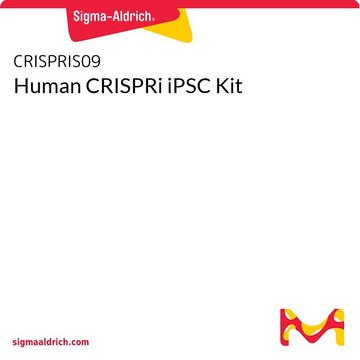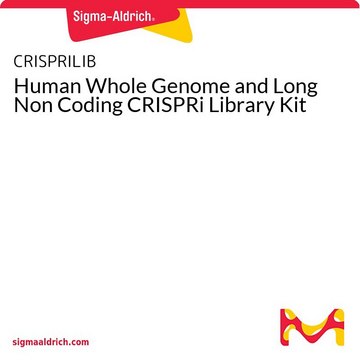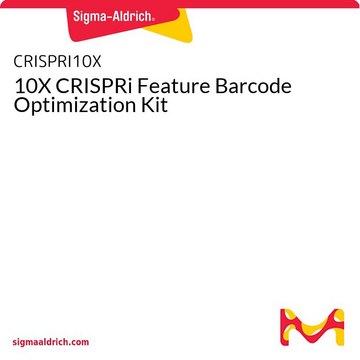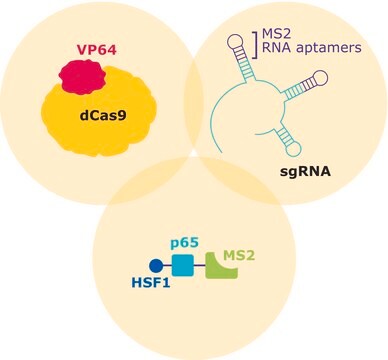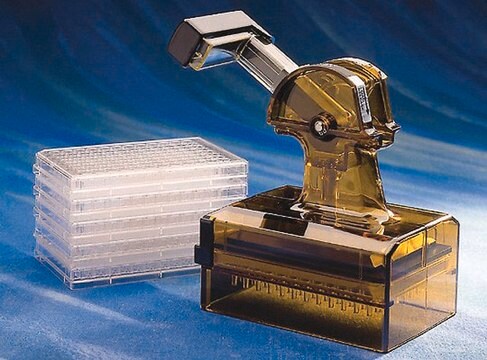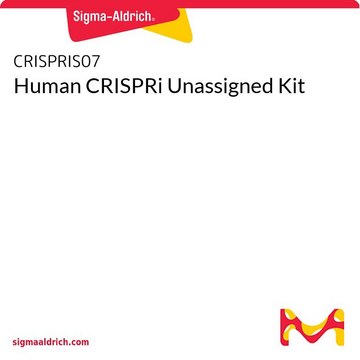CRISPRIS08
Human CRISPRi iPSC and Common Cancer Cell Lines Kit
Autenticatiper visualizzare i prezzi riservati alla tua organizzazione & contrattuali
About This Item
Codice UNSPSC:
12352200
NACRES:
NE.02
Prodotti consigliati
Confezionamento
pkg of 16 vials (4x50μL aliquots for each of the 4 kit components)
applicazioni
CRISPR
Condizioni di spedizione
dry ice
Temperatura di conservazione
−70°C
Descrizione generale
CRISPRi is a potent tool for modulating gene expression. This technology uses dCas9 to act as a synthetic transcription factors by recruiting endogenous transcription repressor complexes to gene promoters and enhancers, resulting in down regulated gene transcription. CRISPRi achieves LOF phenotypes without the limitations of RNAi and CRISPR KO, although CRISPRi relies on delivery by lentivirus, this technology offers new possibilities for genome engineering. CRISPRi can be used individually to target areas of the genome that are inaccessible by other gene perturbation technologies (e.g., non-coding regions) or in conjunction to uncover gene-regulatory networks underlying discrete phenotypes. Finally, pooled CRISPRi screening can be paired with single-cell RNA-sequencing methods to enable high-dimensional characterization of CRISPR gene perturbation.
Human CRISPRi iPSC and Common Cancer Cell Lines Kit contains 1 sub-pools of top 5 gRNAs per gene as well as a separate sub-pool of 5 supplemental gRNAs per gene for increased sensitivity and includes non-targeting controls built in. All pools are functionally titered based on # of guides to provide approximately 3 replicates depending on cell line at 500 gRNAs per cell. Vectors contain both BFP and puromycin as selection markers and an optimized scaffold for sgRNA expression and function. Each sub pool of the library includes non-targeting sgRNA controls. The UCOE KRAB-dCas9 effector is designed for consistent expression and inhibition allowing gene silencing loss-of-function screening with less risk of toxicity to your cells due to double stranded breaks which make the CRISPRi system the ideal choice for perturbation of non-coding genes, applications that call for a reversible, titratable solution, and essential genes.
For more information about screening with CRISPRi/a please Click Here.
Human CRISPRi iPSC and Common Cancer Cell Lines Kit contains 1 sub-pools of top 5 gRNAs per gene as well as a separate sub-pool of 5 supplemental gRNAs per gene for increased sensitivity and includes non-targeting controls built in. All pools are functionally titered based on # of guides to provide approximately 3 replicates depending on cell line at 500 gRNAs per cell. Vectors contain both BFP and puromycin as selection markers and an optimized scaffold for sgRNA expression and function. Each sub pool of the library includes non-targeting sgRNA controls. The UCOE KRAB-dCas9 effector is designed for consistent expression and inhibition allowing gene silencing loss-of-function screening with less risk of toxicity to your cells due to double stranded breaks which make the CRISPRi system the ideal choice for perturbation of non-coding genes, applications that call for a reversible, titratable solution, and essential genes.
- Individual CRISPRi clones are easily ordered online or by contacting your local sales representative
- Custom pools for follow up screening or 10x Genomics Compatible CRISPR pools are also available by contacting your local sales representative
For more information about screening with CRISPRi/a please Click Here.
Applicazioni
- Functional Genomics/Target Validation
- Unbiased forward genetic screening
- Set up and optimization of screen assay
- Creation of cell lines stably expressing KRAB-dCas9
- Positive and negative controls
Caratteristiche e vantaggi
- Complete ready to use screening kit, including targeted screening pool, effector and positive and negative control
- Best in Class UCSF gRNA selection algorithm and optimized (F+E) gRNA scaffold
- Ease of optimization: Validated positive control targeting RAB1A and non-targeting control for assay set up
- UCOE KRAB-dCas9 for consistent effector expression across a wide variety of cell lines
- Libraries provided at high functional titer, based on FACs or CFU analysis
- Use puromycin and or BFP as selection markers
- lncRNA targets from UCSF consolidated from into iPSC and Common Cancer Cell Lines
Componenti
1 Subpool with a minimum concentration of 1x108 TU/mL(via FACS assay)
CRISPRIL15: CRISPRi Pool Long Noncoding iPSC and Common Cancer Cell Lines 1
2 Controls and 1 Effector Construct with a minimum concentration of 5x105 TU/mL(via FACS or CFU assay) CRISPRIE: KRAB-dCAS9 CRISPRi Construct Lentiviral Transduction Particles
CRISPRI01: CRISPRi Rab1a Control Lentiviral Transduction Particles
CRISPRI06: CRISPRi Nontargeting Control Puromycin Transduction Particles
CRISPRIL15: CRISPRi Pool Long Noncoding iPSC and Common Cancer Cell Lines 1
2 Controls and 1 Effector Construct with a minimum concentration of 5x105 TU/mL(via FACS or CFU assay) CRISPRIE: KRAB-dCAS9 CRISPRi Construct Lentiviral Transduction Particles
CRISPRI01: CRISPRi Rab1a Control Lentiviral Transduction Particles
CRISPRI06: CRISPRi Nontargeting Control Puromycin Transduction Particles
Principio
The power of CRISPR for genome engineering, coupled with the ability to perform large-scale, whole genome, loss-of-function (LOF) screening, has allowed for new breakthroughs identifying gene pathways in drug resistance and disease. CRISPR is most commonly used to create double-stranded breaks that often result in loss of gene function (CRISPR-KO). However, the full extent of CRISPR′s utility extends beyond just targeted cutting of DNA. Nuclease-independent applications of CRISPR provide equal targeting specificity but instead of cutting, CRISPRi allows for targeted interference of gene function by delivering transcriptional repressor domains to a specific target sequence using modified dCas9 + gRNA complexes. Gene knockdown is complementary to CRISPR-KO and CRISPRa (activation) and has distinct advantages over existing loss-of-function strategies like RNAi. We partnered with University of California San Francisco to provide the best-in-class CRISPRi screening tools available.
Codice della classe di stoccaggio
12 - Non Combustible Liquids
Scegli una delle versioni più recenti:
Certificati d'analisi (COA)
Lot/Batch Number
Non trovi la versione di tuo interesse?
Se hai bisogno di una versione specifica, puoi cercare il certificato tramite il numero di lotto.
Possiedi già questo prodotto?
I documenti relativi ai prodotti acquistati recentemente sono disponibili nell’Archivio dei documenti.
Il team dei nostri ricercatori vanta grande esperienza in tutte le aree della ricerca quali Life Science, scienza dei materiali, sintesi chimica, cromatografia, discipline analitiche, ecc..
Contatta l'Assistenza Tecnica.
